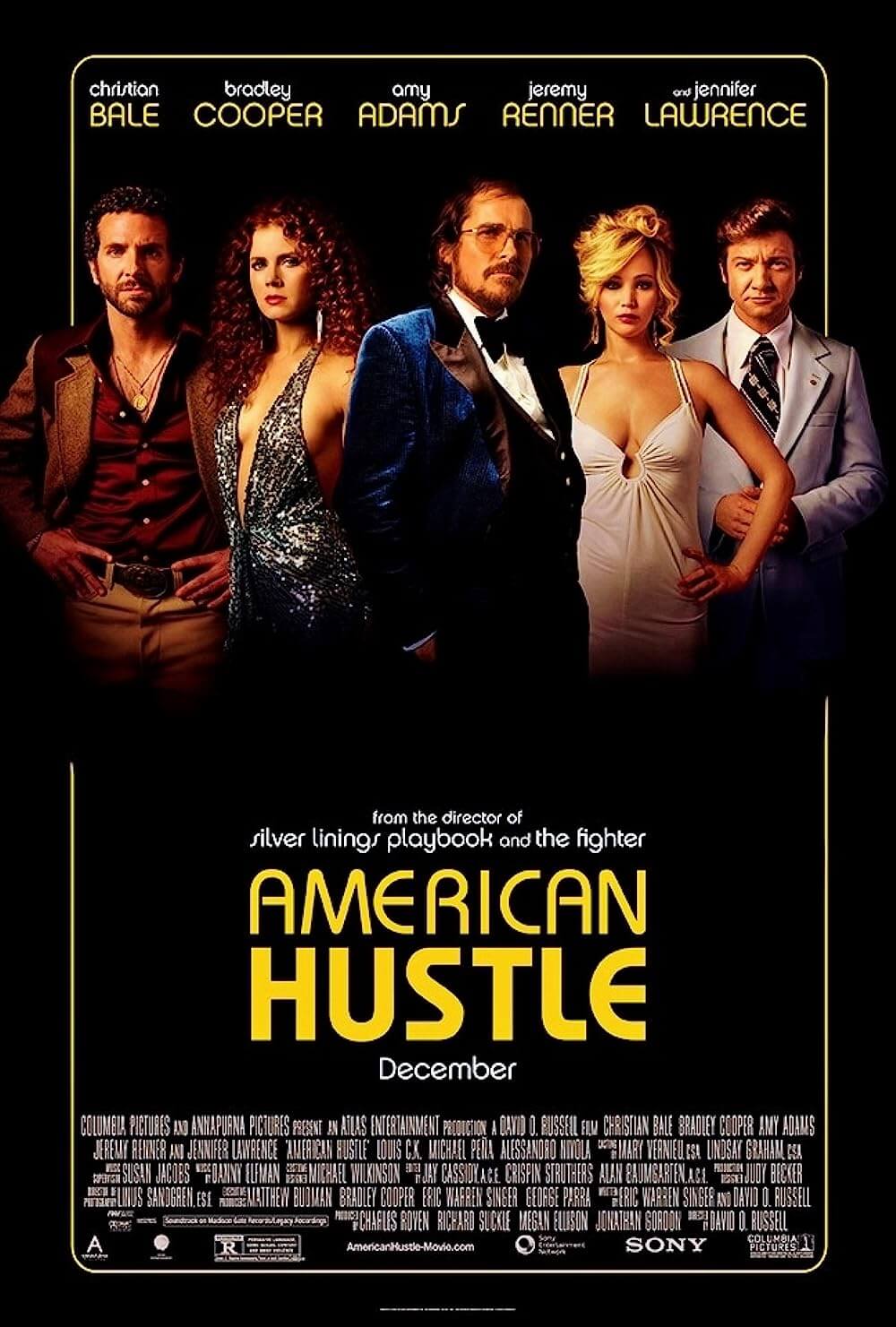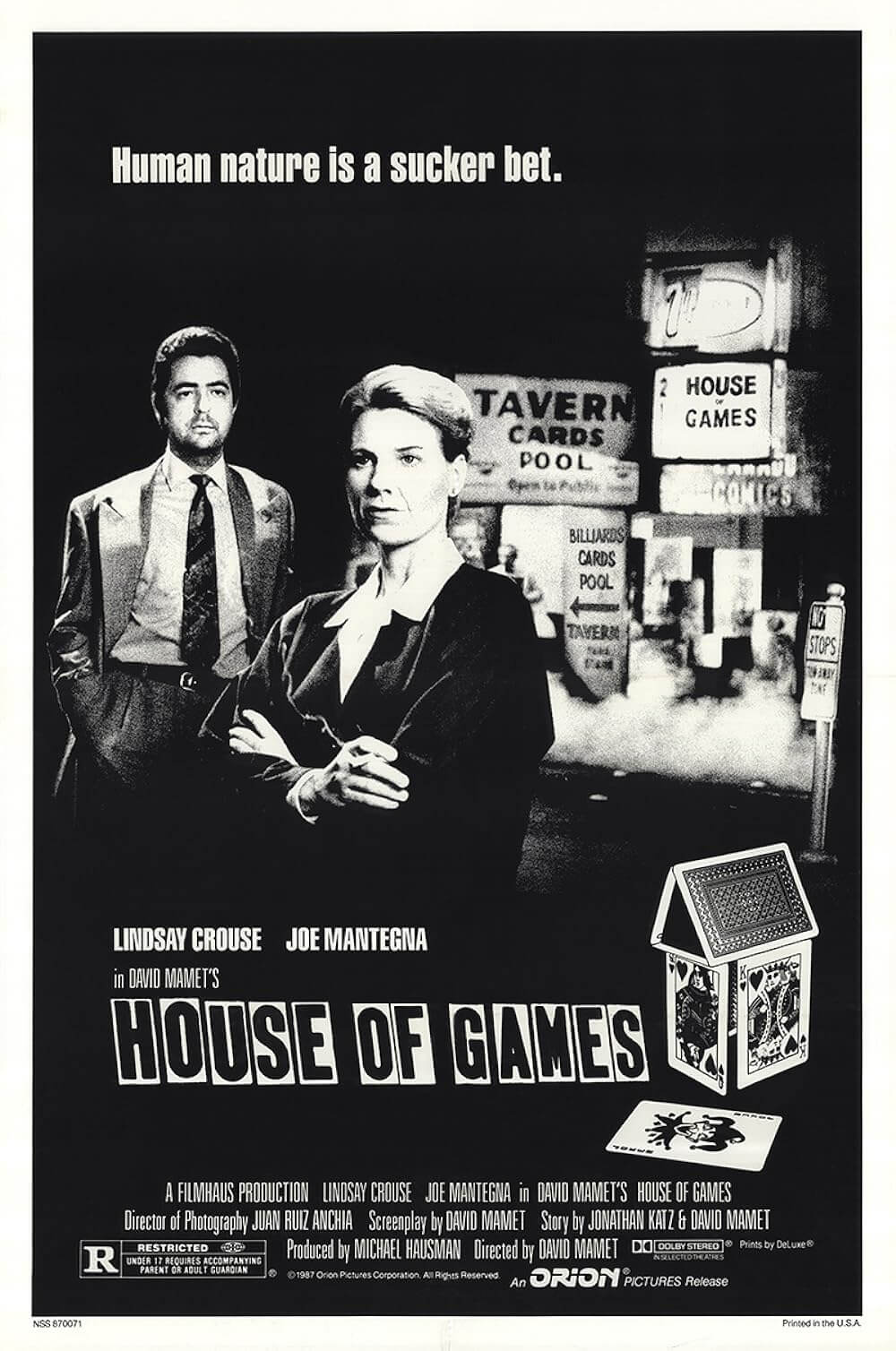
Sharper
By Brian Eggert |
From A24 and Apple TV+, Sharper opens with all the tact of an amateur speech, offering a dictionary definition of the titular term: “One who lives by their wits.” Call them grifters, matchstick men, hustlers, swindlers, scam artists, or smoothies—they all mean the same thing: con artists. Of course, cinema has a rich and varied history of con artist films, from the Best Picture winner The Sting (1973) to perhaps the epitome of the genre, David Mamet’s House of Games (1987). Sometimes they’re psychologically complex character studies, as with Mamet’s film and Stephen Frears’ The Grifters (1990). Sometimes they’re wrapped into entertaining and glamorous packages, such as Steven Soderbergh’s Ocean’s trilogy and Steven Spielberg’s Catch Me If You Can (2002). The list goes on and on, from Paper Moon (1973) to The Brothers Bloom (2008) to American Hustle (2013). But given the saturation of the genre, filmmakers face a unique challenge: How do you stay ahead of viewers who have learned to anticipate the twists and betrayals customary to movies about con artists?
Sharper doesn’t have an answer to that question. It remains a dull substitute for more memorable con artist fare mentioned above. Director Benjamin Caron concocts a familiar scenario where everyone’s trying to take advantage of one another, and no one should be trusted for what they appear to be. However, the screenplay by Brian Gatewood and Alessandro Tanaka offers some novelty by way of its plot structure, which gradually releases information about the characters over a series of non-chronological chapters. The film’s opening dictionary definition and narrative arrangement may bring to mind Quentin Tarantino’s Pulp Fiction (1994). But Caron and company don’t have anything so entertaining, slick, or genre-redefining in store. Instead, the low-key quality of the storytelling, characters, and performances prove serviceable enough to keep our attention but never leave a lasting impression.
The story opens with Tom (Justice Smith), a New York bookstore owner who asks a customer named Sandra (Briana Middleton), a graduate student, on a date. She turns him down at first, but, later that evening, she returns to accept. In a montage covering the weeks that follow, Tom and Sandra have a relaxed but intense romance. All seems idyllic and bound for a lasting relationship until some family drama arises, and Sandra needs $350,000 to rescue her brother from trouble. It turns out Tom isn’t just a lowly bookstore operator; he has the money to help, squirreled away in the bank from his father’s hedge fund. What happens next leads to the subsequent chapter, focused on Sandra—a desperate ex-con enlisted by the charismatic Max (Sebastian Stan), who teaches her how to gain and exploit people’s confidence. Later, we meet Max’s mother, Madeline (Julianne Moore, also a producer), who’s married to a powerful billionaire (John Lithgow).
Although I won’t spoil any of Sharper’s many turns, neither the film’s characters nor performances offer many showy moments. Despite the attractive and talented cast, the most memorable scene involves Sebastian Stan dancing to “Dirty Laundry” by Don Henley (recalling his entertaining dance sequence to a different ’80s hit in last year’s Fresh). With performers of this caliber, along with the promising newcomer Middleton, the film should have given audiences a wowing scene or two. But British helmer Caron, whose experience in prestige television (The Crown, Sherlock, and Wallander) holds potential, delivers a dully even-keeled production. Cinematographer Charlotte Bruus Christensen (The Hunt, 2012) provides scenes with the muted appearance of InstaGram filters in attractive compositions, while editor Yan Miles creates a structure that fits together like a puzzle. This might amount to admirable narrative engineering, except the film lacks personality, edge, and surprises.
After seeing so many con artist movies, the script has no chance of catching the viewer off guard. Every exchange of funds and statement of trust becomes an obvious con. As soon as someone hands over their money—and it changes hands several times—the viewer waits for the script to reveal who’s behind the deception. By the end of this cat-and-mouse game, the viewer will anticipate what happens next. So when the movie resorts to clunky flashbacks and montages to reveal the completed puzzle, the pieces fit into an image we guessed long ago. Sometimes knowing what will happen becomes a way to deepen the characters, but here, they feel secondary to the plot mechanics. Worse, at no point is Sharper smarter than the viewer, which is usually a must for a compelling movie about con artists. If we’re not fooled, why should we believe the characters onscreen are? Perhaps those unfamiliar with con artist movies will enjoy Sharper for its modest pleasures. After all, it’s not that the film is terrible or unwatchable; it’s just predictable and flavorless. Every production element, including the story, remains functional—respectable in every sense but devoid of anything that might distinguish it.

Thank You for Supporting Independent Film Criticism
If the work on DFR has added something meaningful to your love of movies, please consider supporting it.
Here are a few ways to show your support: make a one-time donation, join DFR’s Patreon for access to exclusive writing, or show your support in other ways.
Your contribution helps keep this site running independently. However you choose to support the site, please know that it’s appreciated.
Thank you for reading, and for making this work possible.
Brian Eggert | Critic, Founder
Deep Focus Review







